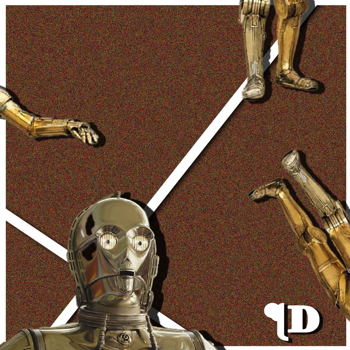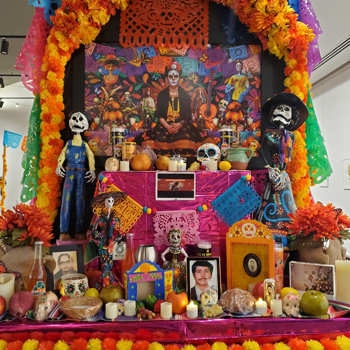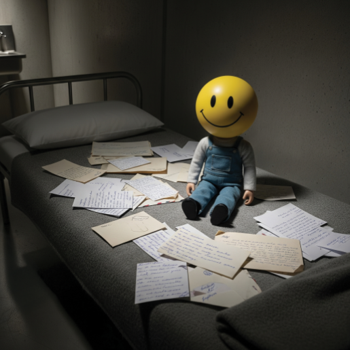Recliner Birthday

"I'll save you,” Lily said, grabbing Luke’s arm, beyond worrying about how she must look to the elderly folk dancers, the ones swooping in on Luke, forcing their dance tutelage upon him. She and Luke were younger, somewhere over forty, if people wanna be nice about it. Lily was grasping his arm, hanging on for (dear?) life, barely treading above a mucked-up pool of distress, a sick joke of a birthday, during which she was imagining everyone’s flesh slowly rotting. Luke was chuckling it off (cuz he’s a real sweet guy, right?), sharing jovially sarcastic looks with her, while the mostly octogenarian ladies paid little attention to his more cerebral analysis of world music. Still gripping his arm, Lily couldn’t actually think of anything civilized that would save him. She’d never before felt this inundated by the essence of sadness—anger seething below. Earlier that morning, she’d been itching for a long delayed fight, the kind that’d pushed former lovers far away. It’d never been clearer to her than it was in the car on the way to the rec center that she’d been stifling Luke’s everything-for-art ambitions, fostering his complacency, for more than fifteen years. Ever since they’d married. And in ways that could end up in more pain, more hellfire, for herself. Luke, himself, was due a reckoning—of this, she was fairly sure. They were both middle-agers, without children or religion, left hanging without a rope.
“Come on, Lily. You’ve gotta laugh.” He nudged her, interrupting any noose-related thoughts, leading her into a moderately paced circle dance. “Hey,” he said, “this song’s like Balkan Bonanza!” He took his position on Lily’s left, ultimately the best spot, per Luke, to imitate her “lovely grace.” It was second nature for her, even in the fog of her current existence. The June heat held the gloom in place, the air as if filled with a clear sticky gel.
“Bonanza, Bonanza,” Luke chanted, swaying side to side. “I guess younger folk . . . wouldn’t be caught . . . dead,” he went on, a bit breathy, like chuckling at himself, one of two men in a room full of bubbies.
For Lily, he was forever a Midwestern farm boy, his eyes blue, blazing with intelligence, his chin strong. (An older, balder, shorter James Dean?) His brownish hair had been long when they’d met. His friends used to say his hair, his skinniness, made him look like Jesus. He’d kept the goatee, the leanness, but his hair was cropped and gray. His eyebrows had always been too thick and dark. Colin Farrell? Though Luke was of average height, he looked taller from a distance. Lily found it hard to separate reality from the fantastical elements that kept good marriages going.
“Up-up-down, NOT down-down-up,” said one of the grannies descending upon Luke and Lily in, seemingly, a life-or-death demonstration of a dance step’s syncopation.
“Can’t you see we’ve got it?” Lily snapped, refusing to focus on the lady’s shuffling feet in Macedonian, curly-toed shoes.
It was much the same in the area’s younger groups that they’d attended off and on, mostly for exercise. Apparently, none of the dancers deemed Lily worthy of notice, though she executed the hardest of dances with a certain finesse, having folk-danced regularly in her youth, along with ballet and modern dance. Even now, her movements joyless, her training must’ve stood-out, but the ladies appeared blind to her dancing, her pseudo-ethnic clothes, her high-rounded cheekbones, dark wavy hair and olive skin, all of which used to draw the attention of the visiting folk-dance teachers, mostly men, coming from faraway lands, asking her if she was Lithuanian, Ukrainian, or sometimes (when younger, tanner) some sort of Sabra. Her eyes were almond-shaped, heavily lashed. Mysteriously dark, per Luke.
They continued dancing, circling close to the boom box, its blast of exotic instruments, the lamenting of peasants. Luke humored Lily, her cute little neuroses. He used to call it that when they’d started dating. She doubted he thought it as cute now. (Though he still loved Woody Allen movies.) On better days, she would’ve appreciated it more, how he remained so upbeat, even while the ladies treated him like his dancing, his beat-keeping, was shit. He was too humble, or too above it all, to explain that—while earning his doctorate years ago—he’d written epic scores for dance, for orchestras, and that off-off-Broadway thingy, all quite brilliant apparently.
“At least they’re not as entitled as the younger folks,” he said, winking at her in that special way—his way of saying (per Lily’s read) that whatever quirky behavior or foreboding image they came across, it was merely more fodder for a tragicomic opera, a masterpiece he’d once been so sure he’d present to the world.
“You’re living a lie,” she said, assessing his aging profile in a pause between dances. Fortunately, he just looked at her and shrugged, like saying huh?
Was she losing all control? She’d always steered him away from talk of the biggest of lies, the one that said human existence meant something, in blatant denial of all the dark horrible things sure to come. She hadn’t wanted him to feel dissatisfied in some deep philosophical way. Then she would’ve felt like a bad wife. But hadn’t she almost lost it in the car that morning?
“I think . . . let’s nix the Namaste Center,” she said, not seeing any value in stopping there later. The last thing she needed was the holier-than-thou tantric yoga crowd with their thirty-dollars-a-head admission fee. She wasn’t even sure why she’d planned the folk dancing.
“Lily, move!” Luke pulled her out of the way of a swarthy granny snaking around a line dance, the dance picking up speed, some of the ladies struggling to keep up. “Opa!” the stout lady bellowed. “It’s easy . . . for beginners,” she said, as she “grapevined” by.
“I know. I actually know it,” Luke said, his face tinged with irritation. Lily always thought it looked funny and sexy on him, when directed at people other than her. He then looked to be recalibrating—to the full professor he currently was in a nearby university—allowing himself to be beckoned into the dance.
He was an easygoing guy, made even more agreeable due to decades of juggling the politics in academia. He rarely blamed her (only in that fight long ago) for the stagnation he sometimes brought up. Yet, earlier on, he used to suggest she help with his opera, a spectacle he’d been mulling over, at least since they’d met. She’d told him it had no plot. It still didn’t. It continued to lack anywhere near sufficient funding. She’d probably been glad he’d gotten too busy with his classes, his school committees and initiatives. Some part of her had worried that, if it were up to him, he’d have thrown all their savings into an opera. And what about that major motion picture he’d always wanted to direct?
“Luke!”
She made her way around the back of the circle, offering up some compassionate thoughts to the so-called big man in the sky, if he’d just help her find Luke. So what if the granny divas reminded her she was destined to be old, not special. If she mingled, she’d find many still engaging and kind. A couple of them called out for her to join. “It’s easy.” But she stayed behind the circle, an age-old wedding dance for women—all except for Luke—thinking that at least these ladies continued to be active, hopeful, not moping around in physical or existential discomfort.
She spotted Luke, no doubt extracted from the circle by the tiny, hunched-over lady gripping his arm with bony fingers, who (Luke told her later) was instructing him on the lift of a step, two inches—not his three—off the floor. Lily broke in, leading him off the dance floor while he still had a chance. Not yet stooped over in ultimate mediocrity! She escorted him out the rec center into the glare of the afternoon, the tsunami of heat sheening-up their faces as they walked to their fully baked car. “Where to?” Luke said, as they drove down the long Pompano Beach boulevards, the endless soullessness of storefronts and strip malls.
***
“Maybe we’ll find a recliner,” Luke said, as they plunged into the vastness of the Festival Mall, the granddaddy of flea markets, perhaps one square mile of depressed goods.
On better days, she might’ve warmed up to some of the booth workers, finding the ones just waiting to be friendly. Many of them barely spoke English, but still so humble, so thankful for her help in the clinics where she volunteered. She and Luke actually preferred them to the gringo “natives.” Their next-door neighbor, for instance: a late-middle-aged beach babe (set on “auto-bitch”) with the requisite boobs bulging from a skintight top, the badly dyed blond hair gathered up, erupting from her head. Lily knew it was best not to dwell on it. Any attempt to separate people into demographics—something South Florida had done so well in its communities—would make her appear spoiled, superior. That’s not how she felt. She and Luke were maybe the most suffering of all groups, failed artists, as he sometimes said about other folks, but he could’ve just as well said it about themselves.
“Whooh,” he said, looking dazed and paler than usual while he took it all in, the clutter of his own life times a thousand. She got close enough to catch one of his unconscious-sounding sighs. These, she’d always figured, were due to being married to her.
“Let’s move on,” she said, entering a zone of so-called antiques. Why’d she suggested this? It was worse than the folk dancing. “Maybe we’ll find something,” she said, her voice droning as they trudged through row after disordered row of everybody’s grandma’s knickknacks, heaps of musty clothing and jammed-up furniture culled from moldy attics. All the sepia-toned photos of ancient Chassidic gentlemen and other forgotten family members made her think of the painting of herself at eight, the one she’d acquired upon her mom’s death. She envisioned it in a garbage dump, having no heirs to claim it. But she’d been considered a pretty child, so perhaps it’d be miraculously preserved through garage sales, ending up on a future Antiques Roadshow—late twentieth-century folk art with no provenance.
“Hey, let’s get this one,” Luke said. “Great for your back.” He was circling a used, well-preserved, recliner. Their first.
She pictured some pot-bellied beast flopped out in the chair, living the bogus dream of Florida leisure. But her back had been acting up, way more than Luke’s back rubs could fix. “Okay,” she said, thinking she should return to work, which required at least partially sitting up all day, writing ad copy, but only if online, having endured too many SFL “professionals” who were sometimes rude to the point of (sly) abuse. Luke seemed okay with it. He’d encouraged her to pursue her poetry and painting classes, her volunteering. She provided administrative and even creative assistance in his career, while keeping herself in shape for regular sex, though this was hard to explain to people who may consider her a freeloader, or anti-feminist, whichever was worse.
“Great!” he said, paying cash on the spot, helping the booth worker drag the chair to the car. He looked relieved that they’d soon make a getaway, but she doubted it would wash off so easily, the tough luck of the living, the useless rot of the dead. He was laughing, making jokes as they took off, his mood adjustment still a bit hard for her to believe. He never seemed to feel guilty for being white, North American, educated, on the upper side of middle class, alive.
***
At the restaurant, she watched Luke lean over his chicken wings—eating too reverently (bowing to the meat), too farmer-man (brought up on a farm where everyone ate fast), too dainty (his pinky out).
“The raspberry sauce is quite good,” he said, sounding like a heady sensualist, which she also found annoying.
“I don’t taste a thing,” she said, putting down her fork. A small child had taken over her voice. “You’d be better off without me.”
“Oh, Lily.” He frowned, though sweet, teasing. “I know it sucks getting older. Tell me about it. I get passed over for so many things, but I keep going.“
“We keep going.”
“I know it’s hard sometimes.” He chomped a piece of celery, put it down. “I thought we were gonna party? It’s your birthday!”
She shrugged. She couldn’t bring herself to remind him that life was ultimately one big insult, a horrible humbling, the fact that people had to imagine not existing one day. For her and Luke, this was sooner than later.
“Come on, Lily, let’s have some fun.” He waved his arms, mock jazz hands, catching the attention of some has-been beach-boys at the next table.
Luke often seemed to be “acting” in some way, performing in some way (a teacher, after all). But then again, she’d never fully understood men, not since her father split when she was a girl. Luke’s boyhood photographs (that she kinda wished she’d never seen) confirmed he’d been super-nerdy. Later, he’d been a PhD candidate and a (seemingly happy) starving artist. By his late twenties, he’d started attracting more chicks, but he could count on one hand the women he’d slept with before Lily. Really, he’d seemed so refreshingly self-aware during their first few dates, a self-proclaimed Pisces poster boy who’d been saving a trainwreck of a girlfriend before he’d met her.
Currently, he was squeezing her knee under the table, the concern on his face, now clearly genuine, getting to her, as if he were channeling his own reportedly devoted mother, which she’d always considered one of the most beautiful things about him, even if it did bring to mind a kindly Midwestern matron trapped in a man’s body.
“You wanna take your pill when we get home, Lily? Maybe half?” He laid his hand over hers which was gripping her water glass.
She’d never really asked, but she suspected her outbursts—her anger and sadness in response to fools and assholes—provided an outlet, a release, for him, however unconscious. Her alternative? Medication-induced Zombieland. Though currently unable to see herself clear of this dinghy world all her own, she’d been so proud a few days before when she’d announced her medication-free life to Luke, with the renewed hope to really feel, to create. To live!
“Lily? Where’re you going?”
She set out for the ladies’ room, passing the laughing, barking people.
“Fuckin gross,” said a skanky, phlegmy woman coming out of a small restroom that was likely wood-paneled in the ‘70s. The air was so sodden, Lily fought the urge to vomit. Her face in the mirror was so stark, it teleported her back to the hell of adolescence (where everyone’s shit probably started), when she’d hidden away in her mom’s house in bedbound melancholia. More acceptable in those days? Holed up in her childhood bed, she’d been so terrified of bad emotions, she’d kept a razorblade in a bathroom drawer, just in case. She barely remembered the adulthood that’d followed, filtered by booze, pot, nicotine, sugar, and all the losers she’d dated. She’d found the wondrously durable Luke about the same time she’d discovered SSRIs. Things had been relatively peaceful, at least when she’d taken her pills. She’d tried therapy. Why was she so deficient? Was she just too self-centered as her mother used to say?
“You okay in there?”
Her adolescent-self faded away. Her face, once considered pretty, was now misshapen, bludgeoned by life. She cracked the door open, Luke standing behind it, his face close enough to kiss. She caressed his balding head.
It was tragic, really, all the time he’d wasted, giving her a nice life. And he still got happily manic whenever he brought up even the smallest of his creations—the random glitch-art, the mini-installations of sonic ingenuity, the music he’d quick-composed for someone else’s video. Somewhere along the way, she’d quit paying enough attention. It didn’t help that she kinda hated the art world, her subversive vibes linked, as she was clearly beginning to see, to her days as a modern dancer, quitting in her late twenties when the choreographer fired her from a coveted role.
“I’m a horrible wife. I’ve ruined you.”
He didn’t yet look embarrassed. “You’re so hard on yourself.” He reached in for her hand. “Whoops . . . Oh, sorry,” he said as some clueless snowbirds squeezed by. “Time for mojitos,” he said when Lily came out, scooting behind him. He followed her back to the table. She felt his love. She harbored it, along with that little fear that super laidback Luke might’ve swallowed so much frustration—which she assumed he’d endured his entire life—so much anger and pain, he’d just explode one day, then vanish.
“I want a slice of Kentucky Derby pie to go,” she said to the snippy, young and indestructible waitress. It was her birthday, a designated free-eating day. Whether she could taste them or not, the leftovers would all go down her pie hole. But first, she was going to dive headfirst into some liquor. At least, it might make her sexy.
***
It was an “ah-hah” jolt to her body, an “ooh-ah” escaping her lips. On this day, her birthday, her blood free of SSRIs, the alcohol hit her more like pot, her drug of choice given up years before. Now, in her first recliner—it taking all her discomfort, all her angst, in a wide “V”—she eased into a bottoming out, a floating-free.
“All we need,” she said, giggling, “is a sixty-inch plasma.”
“Not quite what I had in mind.” Luke handed her a tumbler so she’d take more gulps of his icy lime concoction.
“Liquid gold,” she murmured, more sighs coming out on their own.
“That better?” He adjusted the recliner’s footrest to ensure her comfort.
“Wonndrousful,” she said, caught up in one of those rare glitches of consciousness. A world warped by love. A blackhole radiating glamour? When Luke stood up, his gaze laser-focused on her, he’d somehow, somewhere, morphed into her favorite version of him, like some old-timey cowboy—kindly, sturdy of soul, but sexy—a young Henry Fonda or Gary Cooper with a splash of Cary Grant.
She couldn’t stop giggling. She needed someone more current than these dudes she’d watched in old movies as a kid. Someone more in anguish? Kurt Cobain? Luke had put on a scraggly rock-star wig.
Later, she couldn’t remember the details, mostly just a sense of pure emotion, seamless pleasure. She didn’t feel frustrated, sitting up later, half-naked, in the recliner. Luke, wigless and shadeless, had ended up on the couch across from her.
“Lily, I’m excited,” he said, his face lit.
“Wow, round two?” she said, with a sleepy chuckle. “I guess anything’s possible. It’s my birthday, right?”
“I’m really psyched about the opera. Everything’s got me thinking.” He felt around for a pen on the coffee-table. “Maybe I got this teaching position . . . I was sent here to make the opera, bring it to the world.”
“Sent by whom? Buddha?” She snickered, though they had been making an effort lately to practice more meditation. For a second, she envisioned the two of them with robes and shaved heads, flying off into the Himalayas.
“You were pretty drunk, Lily.”
“High on luvvv.” She thanked the universe.
“You kinda gave me a theme. For the opera. The thousand people a day moving to Florida. The sunny misery of it all.”
“Oh?” She remembered trying to make a joke, an offhand remark.
He was stroking his chin, professor-like, his eyes bright. “Sweet and snarly mezzo-sopranos . . . gargoyle-babes,” his laughter gleeful, “if I can use your term for our ‘lovely’ next-door neighbor?” His fingers in air quotes.
She didn’t know where he left off and she began when it came to depictions of the unhinged, coined over the years while drunk. “White-trash bitch!” she said, reaching down for a tumbler rolling around under her recliner. “But the sad part is . . . her batshit-crazy hatred . . . nobody even bats an eye at it, not in good ‘ol SoFlo.”
“It’s easier to generalize the men,” he said, laughing, scribbling notes. “Alpha-male man-babies.”
“Amateur narcissists!” she said, using one of his favorite terms, toasting it with the tumbler. Yet it struck her now, more than ever, that she fell into this burgeoning category, the little leagues of the entitled unconscious, stretching from SFL into the world. And she didn’t want Luke stuck down with her, going nowhere fast. He was fired up about a potentially awesome Florida-wacko opera. “I’ll help with whatever I can,” she said. “The proposals. The fucking marketing.” He joined her in a massive eye-roll. “We could use our own money, Luke, to fill in the gaps.” She sat back, his good wife.
Would he need an agent? She couldn’t bring herself to ask. A publicist? Whenever Luke mentioned these shysters, they appeared to charge a shit-ton of money. His school didn’t help, not enough. (Fucking bean counters!)
“We’ll use it on what’s important,” he said, rising up from the couch long enough to give her a kiss. “I mean, who’ve we got to leave it to?”
What if they got seriously ill? What about costly experimental treatment? She wasn’t going to bring it up, not while he was sketching out his opera. Did they really want to die in some pissy Medicaid home? And what about water? A gallon of water will be a hundred bucks one day! There’ll be cataclysmic wars over water. Over fuel. People will scramble, fleeing flood and fire zones. Housing costs will go through the roof, the sky!
“I need more booze,” she said, pulling herself up, out of the recliner. She wrapped a robe around her boobs and belly. Droopy, histrionic. That’s how people would describe her? She reached for a bottle of rum on the coffee table and swigged it. “There’s still time,” she said, catching the hour on the clock, 11:32 p.m., still her birthday. She gulped the rum. It did nothing to quell her.
What about the leftovers? “Let’s eat,” she said.
“It’s really late,” he said, frowning at the thought of hunger-less eating, though his face was game when she returned, handing him a plate of leftovers before sitting back down in her recliner.
In her lap was a heaping plate of wings, onion rings, a slab of brisket, a chunk of buttery bread, candied baby carrots, bacon-ated Brussels sprouts and, of course, her chocolate pie.
“I’ve got another twenty minutes to be bad, right?” She tore into a wing, her taste buds hit with the spicy key-lime sauce that soaked the crust. She didn’t stop to swallow before shoving in an onion ring, a crunchy piece of carrot, a chunk of brisket slathered on garlic bread.
“Ahh so gooh,” she said, pushing an errant onion ring back into her mouth.
“Yeah, it’s really good,” he said, wing juice running down his chin.
“Gooh—AACK—” She felt around in her lap for another handful of food. She shoved it in.
“Slow down, okay?”
“Aaah—I caah— aaah—”
“Lily! What the fuck!” His plate flipped off his knees, crashing to the floor, the joy of spicy wings fading from his face, struck by terror.
She wanted to show him so much love with her eyes, like pictures she’d seen of Joan of Arc or something, but her eyes felt cartoonish, ready to pop outta her face.
She spoke with only hideous choking and retching sounds. No air! The world was a circle, Luke’s face in its middle, shrinking further away, but still there with her, his horrendous concern.
He pulled her up and out of the chair, swinging her around like in a crazy couples’ dance, his arms pulling her back, hugging her from behind. “Lily, cough it up! Lily!”
She really hoped he’d be free and famous.





